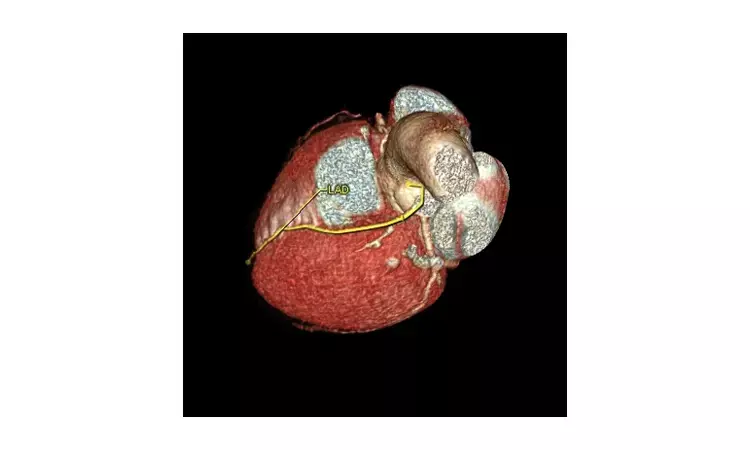- Home
- Medical news & Guidelines
- Anesthesiology
- Cardiology and CTVS
- Critical Care
- Dentistry
- Dermatology
- Diabetes and Endocrinology
- ENT
- Gastroenterology
- Medicine
- Nephrology
- Neurology
- Obstretics-Gynaecology
- Oncology
- Ophthalmology
- Orthopaedics
- Pediatrics-Neonatology
- Psychiatry
- Pulmonology
- Radiology
- Surgery
- Urology
- Laboratory Medicine
- Diet
- Nursing
- Paramedical
- Physiotherapy
- Health news
- Fact Check
- Bone Health Fact Check
- Brain Health Fact Check
- Cancer Related Fact Check
- Child Care Fact Check
- Dental and oral health fact check
- Diabetes and metabolic health fact check
- Diet and Nutrition Fact Check
- Eye and ENT Care Fact Check
- Fitness fact check
- Gut health fact check
- Heart health fact check
- Kidney health fact check
- Medical education fact check
- Men's health fact check
- Respiratory fact check
- Skin and hair care fact check
- Vaccine and Immunization fact check
- Women's health fact check
- AYUSH
- State News
- Andaman and Nicobar Islands
- Andhra Pradesh
- Arunachal Pradesh
- Assam
- Bihar
- Chandigarh
- Chattisgarh
- Dadra and Nagar Haveli
- Daman and Diu
- Delhi
- Goa
- Gujarat
- Haryana
- Himachal Pradesh
- Jammu & Kashmir
- Jharkhand
- Karnataka
- Kerala
- Ladakh
- Lakshadweep
- Madhya Pradesh
- Maharashtra
- Manipur
- Meghalaya
- Mizoram
- Nagaland
- Odisha
- Puducherry
- Punjab
- Rajasthan
- Sikkim
- Tamil Nadu
- Telangana
- Tripura
- Uttar Pradesh
- Uttrakhand
- West Bengal
- Medical Education
- Industry
Diltiazem may not improve coronary vasomotor dysfunction in angina and ANOCA- EDIT CMD Trial

Cardiac diseases are becoming very difficult to manage. Diltiazem is recommended and frequently prescribed in patients with angina and non obstructive coronary artery disease (ANOCA), suspected of coronary vasomotor dysfunction (CVDys). However, studies substantiating its effect is this patient group are lacking.
One of the first performed Randomized Control Trial in patients with ANOCA has reported that six weeks therapy with diltiazem did not substantially improve coronary vasomotor dysfunction, symptoms or quality of life when compared with placebo , but did reduce prevalence of epicardial spasm.
The EDIT CMD trial has been published in JAAC Cardiovascular Imaging.
The randomized, placebo controlled EDIT CMD trial (RCT) , evaluated the effect of diltiazem on CVDys, as assessed by repeated coronary function testing (CFT), angina and quality of life. A total of 126 ANOCA patients were included and underwent CFT. CVDys, defined as the presence of vasospasm (after intracoronary acetylcholine provocation) and/or microvascular dysfunction (CFR <2.0, IMR ≥25), was confirmed in 99 patients, of whom 85 were randomized to receive either oral di ltiazem or placebo up to 360mg/day. After 6 weeks a second CFT was performed. The primary endpoint was the proportion of patients having a successful treatment, defined as normalization of one abnormal parameter of CVDys and no normal parameter becoming ab week follownormal. Secondary endpoints were changes from baseline to 6 up in vasospasm, IMR, CFR, symptoms (SAQ) or quality of life (RAND Results : 36).
The results of the trial were
• In total, 73 patients (38 diltiazem vs. 35 placebo) underwent the second CFT. Improvement of the CFT di d not differ between the groups (diltiazem vs. placebo: 21% vs. 29%, p=0.46).
• However, more patients on diltiazem treatment progressed from epicardial spasm to microvascular or no spasm (47% vs. 6%, p=0.006).
• No significant differences were observed betwee n the diltiazem and placebo group in microvascular dysfunction, SAQ or RAND36.
Researchers concluded that "In this first performed RCT in patients with ANOCA, we show that six weeks therapy with diltiazem did not substantially improve CVDys, symptoms or quality of life w hen compared with placebo , but did reduce prevalence of epicardial spasm."
Reference: https://doi.org/10.1016/j.jcmg.2022.03.012.
Medical Dialogues consists of a team of passionate medical/scientific writers, led by doctors and healthcare researchers. Our team efforts to bring you updated and timely news about the important happenings of the medical and healthcare sector. Our editorial team can be reached at editorial@medicaldialogues.in.
Dr Kamal Kant Kohli-MBBS, DTCD- a chest specialist with more than 30 years of practice and a flair for writing clinical articles, Dr Kamal Kant Kohli joined Medical Dialogues as a Chief Editor of Medical News. Besides writing articles, as an editor, he proofreads and verifies all the medical content published on Medical Dialogues including those coming from journals, studies,medical conferences,guidelines etc. Email: drkohli@medicaldialogues.in. Contact no. 011-43720751


